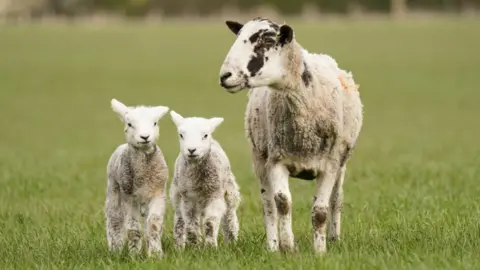European foot-and-mouth cases prompt restrictions
 PA Media
PA MediaRestrictions have been placed on the importation of animals from Germany to the Isle of Man to prevent the spread of foot-and-mouth disease.
The ban on pigs, sheep and cattle imports has been put in place following an outbreak of the infection in the European country last week.
The Department of Environment, Food and Agriculture (DEFA) has now updated its legislation in line with UK, which implemented the restrictions last week.
The government's chief vet Amy Beckett said the "robust measures" were "essential to protect the island's important agricultural sector".
The ban extends to the importation of meat, dairy, or animal products from Germany as well as live exports.
Further measures restricting the importation of untreated wool and hair from animals from outside the British Isles have also been put in place.
'Devastating disease'
Dr Beckett said "vigilance and adherence" to biosecurity were "vital to preventing the spread of this devastating disease".
While the disease posed "no risk" to human health, it was "highly contagious in cloven-hoofed animals, such as pigs, sheep, and cattle, and can lead to significant economic losses", she added.
While there have been no known cases of foot-and-mouth disease in the British Isles since the recent cases in Germany, there were major outbreaks in 2001 and 2007, which led to the slaughter of millions of livestock.
DEFA has urged farmers to "maintain strict biosecurity measures to protect their herds and monitor animals for clinical signs, such as blisters, lameness, or fever".
The department has also reminded people that it is an offence not to report a case of the disease to the government.
Why not follow BBC Isle of Man on Facebook and X? You can also send story ideas to [email protected]
